七年级英语上册Unit 5 Do you have a soccer ball Section A(1a-1c)课件 人教新目标版
七年级英语上册 Unit 5 Do you have a soccer ball(单词+重点句型)语法解析
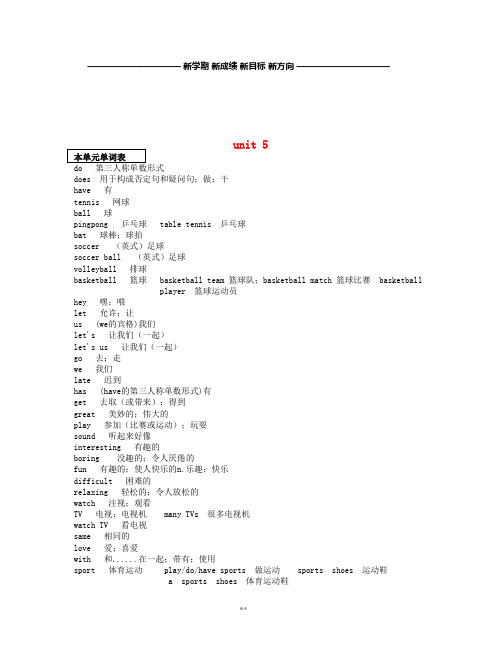
——————————新学期新成绩新目标新方向——————————unit 5does 用于构成否定句和疑问句;做;干have 有tennis 网球ball 球pingpong 乒乓球 table tennis 乒乓球bat 球棒;球拍soccer (英式)足球soccer ball (英式)足球volleyball 排球basketball 篮球 basketball team 篮球队;basketball match 篮球比赛 basketball player 篮球运动员hey 嘿;喂let 允许;让us (we的宾格)我们let's 让我们(一起)let's us 让我们(一起)go 去;走we 我们late 迟到has (have的第三人称单数形式)有get 去取(或带来);得到great 美妙的;伟大的play 参加(比赛或运动);玩耍sound 听起来好像interesting 有趣的boring 没趣的;令人厌倦的fun 有趣的;使人快乐的n.乐趣;快乐difficult 困难的relaxing 轻松的;令人放松的watch 注视;观看TV 电视;电视机 many TVs 很多电视机watch TV 看电视same 相同的love 爱;喜爱with 和......在一起;带有;使用sport 体育运动 play/do/have sports 做运动 sports shoes 运动鞋a sports shoes 体育运动鞋them (they的宾格)他(她、它)们only 只;仅like 喜欢;喜爱easy 容易的;不费力的after 在......以后class 班级;课(近义词:lessen);等级;类别;阶段classmate 同班同学 roommate 室友 workmate 同事 deskmate 同桌schoolmate 校友Bill 比尔(男名)on的用法,详见unit4【解析】on可以表示“通过;使用……方式”,后面通常接表示通信工具的名词。
Unit 5 Do you have a soccer ball 知识点归纳-七年级上册英语

人教版新目标七上英语单元知识点归纳Unit 5 Do you have a soccer ball?重点词汇tennis/'tenis/ n. 网球bat /bæt/ n. 球棒;球拍soccer ball (英式)足球volleyball/'vɔlibɔ:l/ n. 排球basketball/'ba:skitbɔ:l/ n. 篮球late/leit/ adj. 迟到great/greit/ adj. 美妙的;伟大的play/plei/ v. 参加(比赛或运动);玩耍sound/saund/ v. 听起来好像interesting/'intrəstiŋ/ adj. 有趣的boring/'bɔ:riŋ/ adj. 没趣的;令人厌倦的fun/fʌn/ adj. 有趣的;使人快乐的n.乐趣;快乐difficult/'difikəlt/ adj. 困难的relaxing/ri'læksiŋ/ adj. 轻松的;令人放松的watch/wɔtʃ/ v. 注视;观看same/seim/ adj. 相同的easy/'i:zi/ adj. 容易的;不费力的class/kla:s/ n. 班级;课classmate/'kla:smeit/ n. 同班同学重点短语:a tennis bat 一个网球拍play basketball 打篮球baseball bat 棒球棒have a soccer ball 有一个足球play soccer 踢足球with our friends 和我们的朋友一起have a ping-pong ball 有一个乒乓球play ping-pong 打乒乓球have a volleyball 有一个排球play volleyball 打排球at school 在校,上学play sports 做运动watch TV 看电视in my bag 在我的包里be late 迟到on TV 电视上必背典句:1. Do you have a soccer ball? 你有一个足球吗?2. Does he/she have a ping-pong ball?他/她有一个乒乓球吗?3. Do you play sports with your classmates? 你和你的同学一起做运动吗?4. Let’s play soccer together! 我们一起踢足球吧!5. How many sports do you like?你喜欢多少种运动?6. I like playing soccer and basketball. 我喜欢踢足球和打篮球。
英语人教版七年级上册Unit5 Do you have a soccer bal
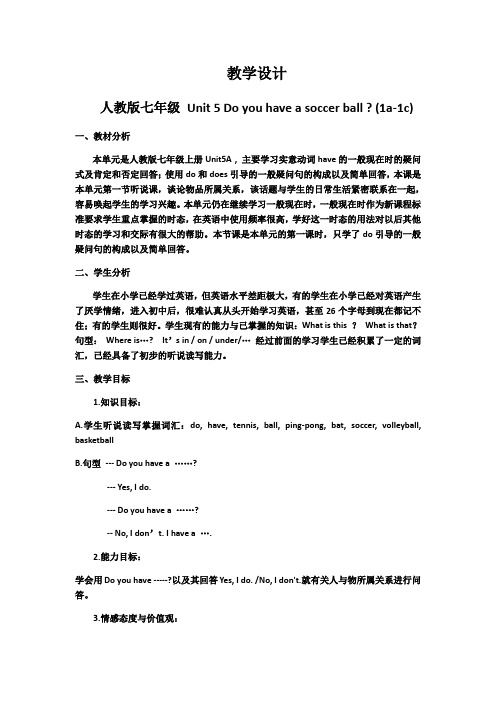
教学设计人教版七年级Unit 5 Do you have a soccer ball ? (1a-1c) 一、教材分析本单元是人教版七年级上册Unit5A , 主要学习实意动词have的一般现在时的疑问式及肯定和否定回答;使用do和does引导的一般疑问句的构成以及简单回答,本课是本单元第一节听说课,谈论物品所属关系,该话题与学生的日常生活紧密联系在一起,容易唤起学生的学习兴趣。
本单元仍在继续学习一般现在时,一般现在时作为新课程标准要求学生重点掌握的时态,在英语中使用频率很高,学好这一时态的用法对以后其他时态的学习和交际有很大的帮助。
本节课是本单元的第一课时,只学了do引导的一般疑问句的构成以及简单回答。
二、学生分析学生在小学已经学过英语,但英语水平差距极大,有的学生在小学已经对英语产生了厌学情绪,进入初中后,很难认真从头开始学习英语,甚至26个字母到现在都记不住;有的学生则很好。
学生现有的能力与已掌握的知识:What is this ?What is that?句型:Where is…? It’s in / on / under/…经过前面的学习学生已经积累了一定的词汇,已经具备了初步的听说读写能力。
三、教学目标1.知识目标:A.学生听说读写掌握词汇:do, have, tennis, ball, ping-pong, bat, soccer, volleyball, basketballB.句型--- Do you have a ……?--- Yes, I do.--- Do you have a ……?-- No, I don’t. I have a ….2.能力目标:学会用Do you have -----?以及其回答Yes, I do. /No, I don't.就有关人与物所属关系进行问答。
3.情感态度与价值观:A热爱体育活动,培养适合自己的体育爱好,锻炼身体。
B.在小组活动中,培养学生团结协作精神。
人教版七年级上Unit5 Do you have a soccer ball知识点归纳
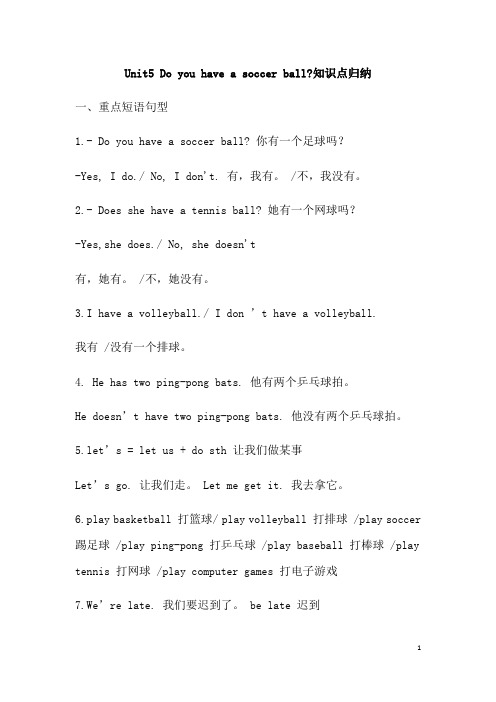
Unit5 Do you have a soccer ball?知识点归纳一、重点短语句型1.- Do you have a soccer ball? 你有一个足球吗?-Yes, I do./ No, I don't. 有,我有。
/不,我没有。
2.- Does she have a tennis ball? 她有一个网球吗?-Yes,she does./ No, she doesn't有,她有。
/不,她没有。
3.I have a volleyball./ I don ’t have a volleyball.我有 /没有一个排球。
4. He has two ping-pong bats. 他有两个乒乓球拍。
He doesn’t have two ping-pong bats. 他没有两个乒乓球拍。
5.let’s = let us + do sth 让我们做某事Let’s go. 让我们走。
Let me get it. 我去拿它。
6.play basketball 打篮球/ play volleyball 打排球 /play soccer 踢足球 /play ping-pong 打乒乓球 /play baseball 打棒球 /play tennis 打网球 /play computer games 打电子游戏7.We’re late. 我们要迟到了。
be late 迟到8.That sounds good. 那听起来很不错。
That sounds interesting/fun/relaxing/boring/difficult. 那听起来很有趣 /放松 /无聊 /困难。
9.watch TV 看电视10.play sports with our classmates 和我的同学做运动11.go to the same school 去同一间学校上学。
12.at school 在学校13.only watch them on TV 只在电视上看它们14.It ’s adj(形容词) for sb.对某人来时怎么样。
人教版七年级上册英语 Unit 5 Do you have a soccer ball 知识点总结
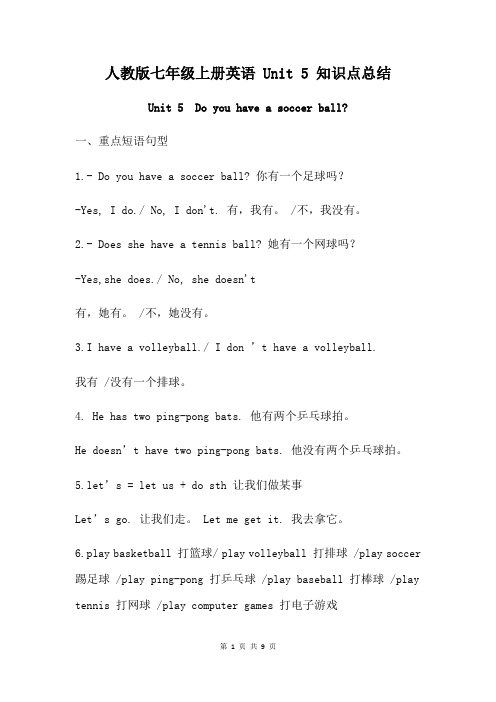
人教版七年级上册英语 Unit 5 知识点总结Unit 5 Do you have a soccer ball?一、重点短语句型1.- Do you have a soccer ball? 你有一个足球吗?-Yes, I do./ No, I don't. 有,我有。
/不,我没有。
2.- Does she have a tennis ball? 她有一个网球吗?-Yes,she does./ No, she doesn't有,她有。
/不,她没有。
3.I have a volleyball./ I don ’t have a volleyball.我有 /没有一个排球。
4. He has two ping-pong bats. 他有两个乒乓球拍。
He doesn’t have two ping-pong bats. 他没有两个乒乓球拍。
5.let’s = let us + do sth 让我们做某事Let’s go. 让我们走。
Let me get it. 我去拿它。
6.play basketball 打篮球/ play volleyball 打排球 /play soccer 踢足球 /play ping-pong 打乒乓球 /play baseball 打棒球 /play tennis 打网球 /play computer games 打电子游戏7.We’re late. 我们要迟到了。
be late 迟到8.That sounds good. 那听起来很不错。
That sounds interesting/fun/relaxing/boring/difficult. 那听起来很有趣 /放松 /无聊 /困难。
9.watch TV 看电视10.play sports with our classmates 和我的同学做运动11.go to the same school 去同一间学校上学。
人教版英语七年级上册Unit-5--do-you-have-a-soccer-ball

人教版英语七年级上册Unit 5 Do you have a soccer ball?单元教材分析本单元主要学习动词have的一般现在时的用法;使用do和does引导的一般疑问句的构成以及简单回答。
本单元围绕“和朋友一起欢度时光”这一话题安排了三个任务:一是列举所学的运动项目,从中挑选出各自喜欢的体育项目,并说明原因,目的是巩固并新学一些体育项目的名词;二是让学生互相询问所爱好的运动,并根据情况发出邀请,学会用have对物品的所属进行提问与回答,掌握用do和does引导的一般疑问句的构成及使用,了解用Let’s 提建议的句型;三是写作,把任务一、二的完成情况写成日记,进一步复习、巩固所学的语言目标。
通过本单元的学习,学会用have对物品的所属进行提问与回答;学会用let’s…句型提建议;能够谈论自己喜欢哪些球类运动,不喜欢哪些球类运动及原因;能够谈论怎样和自己的朋友度过一段愉快的时光。
单元总体目标.1. 在询问对方是否有某物的对话中学会使用do和does引导的一般疑问句。
2. 学会使用描述性的形容词来评价事物。
3. 学会在对话中使用名词复数。
4. 学会用祈使句来向对方提出建议。
5. 学会用祈使句询问某人是否有某物。
6. 学会向他人提出建议的句子。
7. 学习了解一般现在时。
8. 在本单元中,通过阅读有关运动的文章和对话,使学生更加热爱体育活动并培养一种适合自己的体育爱好。
9.在小组活动中,培养学生团结协作精神。
单元重难点一览表本单元的主题是使用have对物品的所属进行提问及回答,以掌握行为动词在一般现在时中的构成和使用;同时引导学生使用所学的句型谈论自己在球类运动中的喜好。
行为动词在一般现在时的肯定句、否定句和一般疑问句中的构成和使用是初中英语教学中非常重要的内容,本单元知识的掌握程度将直接影响今后的英语学习。
学生在以前的学习中已经掌握了be动词在一般现在时中的构成和使用,在学生的头脑中也已经形成了一个模式,这种模式将直接影响学生对本单元知识内容的接受,所以教师在教学中一定要善于引导,以免学生养成不良习惯。
七年级上册英语正式篇第五单元知识点

Unit 5. Do you have a soccer ball语法专项一般现在时态中have的用法教材典句:1.Do you have a ping-pong bat Yes, I do .你有一个兵乓球吗?是的,我有。
2.Does he have a soccer ball 他有一个足球吗Yes, he does ./ No, he doesn’t . 是的,他有。
/ 不,他没有。
3.I don’t have a soccer ball ..... 我没有足球.....句1、句2是含有实义动词have的一般疑问句,句3是含有实义动词have的否认句。
下面让我们来学习一下have的具体用法吧!语法全解:1.用法:have意为“有〞表示所属关系,其主语一般是人,强调某人拥有某物,有时也可以用作主语。
一般现在时,当主语是第三人称单数形式时,谓语动词用has,其他人称时,谓语动词都用have。
People have their own hobbies. 人们都有自己的业余爱好。
Tom has three pens . 汤姆有3支钢笔。
助记:have的用法动词have表示“有〞位置就在主语后;“三单〞主语用has, 其他人称用have。
一般疑问句很好变,句首直接把do/ does 添;否认句子也容易,don’t/ doesn’t 加在have/ has前;does/ doesn’t 句中现,has要用have来替换。
2.句式⑴. 肯定句:主语+have/ has+......I have an eraser. 我有一块橡皮。
He has a soccer . 他有一个足球。
⑵. 否认句:主语+don’t/ doesn’t +have ......I don’t have an eraser. 我没有橡皮。
He doesn’t have a tennis racket . 他没有网球拍。
⑶. 一般疑问句:Do/ Does+主语+have....肯定答语:Yes, 主语+do/ does否认答语:No, 主语+don’t/ doesn’tDo you have a bike 你有自行车吗?Yes, I do. / No, I don’t . 是的,我有。
七年级英语上册Unit5 Do you have a soccer ball知识点全面讲解与练习
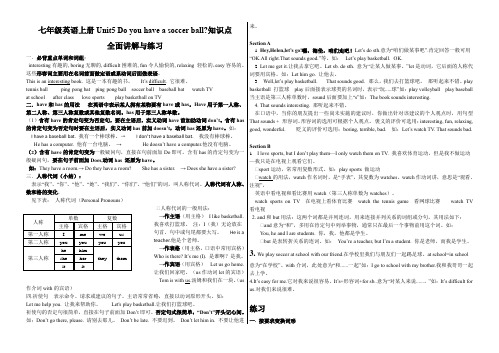
七年级英语上册Unit5 Do you have a soccer ball?知识点全面讲解与练习一.必背重点单词和词组:interesting有趣的, boring无聊的, difficult困难的, fun令人愉快的, relaxing轻松的,easy容易的。
这些形容词主要用在名词前面做定语或系动词后面做表语。
This is an interesting book. 这是一本有趣的书。
It’s difficult. 它很难。
tennis ball ping-pong bat ping-pong ball soccer ball baseball bat watch TVat school after class love sports play basketball on TV二.have和has的用法在英语中表示某人拥有某物要有have或has。
Have用于第一人称、第二人称、第三人称复数或其他复数名词。
has用于第三人称单数。
(1)含有have的肯定句变为否定句,要在主语后,实义动词have前加助动词don’t。
含有has 的肯定句变为否定句时要在主语后,实义动词has前加doesn’t,动词has还原为have。
如:I have a baseball bat. 我有一个棒球棒。
→I don’t have a baseball bat.我没有棒球棒。
He has a computer. 他有一台电脑。
→ He doesn’t have a computer.他没有电脑。
(2)含有have的肯定句变为一般疑问句,直接在句前面加Do即可。
含有has的肯定句变为一般疑问句,要在句子前面加Does,动词has 还原为have。
如:They have a room.→ Do they have a room? She has a sister. → Does she have a sister?三.人称代词(小结):表示“我”、“你”、“他”、“她”、“我们”、“你们”、“他们”的词,叫人称代词。
河南省七年级英语上册Unit5Doyouhaveasoccerball知识点总结归纳完整版

河南省七年级英语上册Unit5Doyouhaveasoccerball知识点总结归纳完整版单选题1、Let them ________ basketball after class.A.playingB.playsC.to playD.play答案:D句意:让他们下课后打篮球。
考查非谓语动词。
let sb. do sth.“让某人做某事”,此处用省略to的动词不定式作宾语补足语。
故选D。
2、Lily ________ playing football because she is not good at it.A.likeB.lovesC.dislikeD.dislikes答案:D句意:莉莉不喜欢踢足球,因为她不擅长踢足球。
考查动词辨析和时态。
like喜欢;loves爱,单三式;dislike不喜欢;dislikes不喜欢,单三式。
根据后句“because she is not good at it.”可知,应是莉莉不喜欢踢足球,故排除A、B项;句子是一般现在时,主语“Lily”是第三人称单数形式,故行为动词dislike后要加s。
故选D。
3、—Where ________ your friend live? — She ________ in London.A.do, liveB.does, livesC.is, live答案:B句意:——你的朋友煮在哪里?——她生活在伦敦。
考查主谓一致。
第一句动词是live,疑问句应用助动词,主语是单数名词,助动词用does;第二句也用一般现在时,主语是第三人称单数,动词用三单形式,故选B。
4、—Daniel looks sad these days.—I see. Let’s try to think of ________ to make him happy.A.enough interesting somethingB.enough interested somethingC.something interesting enoughD.something interested enough答案:C句意:——丹尼尔这些天看起来很伤心。
七年级英语上册《Unit 5 Do you have a soccer ball》知识点 (新版)人教版

Unit 5 Do you have a soccer ball?1. Do you have......? Yes, I do. No, I don’t..你有……吗?是的,我有。
不,我没有。
Do they have......? Yes, they do. No, they don’t..Does he have......? Yes, he does. No, he doesn’t.Does she have......? Yes, she does. No, she doesn’t.在一般现在时中,句子的谓语动词若是实义动词,常借助助动词do或does来构成否定句或疑问句。
Does用于主语是第三人称单数的句子中,其他情况用do。
2. do/does1)作助动词,帮助构成一般现在时的否定句或疑问句,无意义。
Do you have a soccer ball? 你有足球吗?I don’t know. 我不知道。
Does Jim have a sister? 吉姆有妹妹吗?What does he like? 他喜欢什么?He doesn’t like English. 他不喜欢英语。
2) 作实义动词,“做,干”。
I do my homework every day. 我每天都做家庭作业。
Bob does his homework every day. 鲍勃每天都做家庭作业。
3) 在一般现在时中,do/does 可用来替代上文出现过的动词,以避免重复。
Do you have a soccer ball? 你有足球吗?Yes, I do. 是的,我有。
(do 代have)Does she have an eraser? Yes, she does.I don’t have a soccer ball, but my brother Alan d oes.我没有足球,但我的哥哥艾伦有。
3.Let’s do sth. “(让)我们做某事吧。
人教版七年级上册英语讲义 Unit 5 Do you have a soccer ball

Unit5 Do you have a soccer ball?讲义一、【重点单词】do /du:/助动词,帮助构成一般现在时的否定句或疑问句,无意义;实义动词“做,干”have /hæv/有tennis /'tenɪs/网球ball /bɔ:l/球ping-pong乒乓球bat /bæt/球棒;球拍soccer /'sɑ:kər/,/'sɒkə/(英式)足球soccer ball(英式)足球volleyball /'vɒlɪbɔ:l/排球basketball /'bɑ:skɪtbɔ:l/篮球let /let/允许;让us /ʌs/ (we的宾格)我们let's = let us让我们(一起)go /ɡəʊ/去;走we /wi:/我们late /leɪt/迟到has /hæz/有(have的第三人称单数形式)get /ɡet/去取(或带来);得到great /ɡreɪt/美妙的;伟大的play /pleɪ/参加(比赛或运动);玩耍sound /saʊnd/听起来好像interesting /'ɪntrəstɪŋ/有趣的;使人快乐的;乐趣;快乐difficult /'dɪfɪkəlt/困难的relaxing /rɪ'læksɪŋ/轻松的;令人放松的watch /wɒʧ/注视;观看TV /,ti:'vi:/电视same /seɪm/相同的love /lʌv/爱;喜爱with /wɪð/和...在一起;带有;使用sport /spɔ:(r)t/体育运动them /ðem/ /ðəm/他(她、它)们only /'əʊnlɪ/只;仅like /laɪk/喜欢;喜爱easy /'i:zi/容易的;不费力的after /'ɑ:ftə/在...之后class /klɑ:s/班级;课classmate /'klɑ:smeɪt/同班同学二、【重点短语】1. have a volleyball 有一个排球2. play volleyball/tennis 打排球/网球3. have a ping-pong/table tennis 有一个乒乓球4. play ping-pong/table tennis 打乒乓球5. with our friends 和我们的朋友一起6. have a football/soccer ball 有一个足球7. play football/soccer 踢足球8. at school 在校,在上学9. play sports 做运动10. play computer games 玩电脑游戏11. watch TV 看电视12. in the same school 在同一所学校13. after class 下课后14. go to school 去上学三、【重点句型】1. —Do you have a ping-pong bat? 你有一个乒乓球拍吗?—No, I don’t. 不,我没有。
人教七年级上册英语Unit 5 Do you have a soccer ball? 基础知识手册

人教七年级上册英语Unit 5 Do you have a soccer ball?用法集萃1. (That/ it) sounds interesting(fun)/good/difficult/boring/relaxing.那听起来很有趣/好/困难/无聊/轻松。
系动词+ adj.系动词:be; look; sound; smell; taste; feel; get; become2. It’s easy for me.这对我来说挺容易的。
Sth. be + adj. for sb. ……对于某人来说怎么样.for的用法1)供……用,给……的Is this apple for me? 这个苹果是给我的吗?Here is a letter for your mother. 这儿有你妈妈的一封信。
2)作……用(表用途)Do you need bags for sports? 你需要运动包吗?I need a cup for milk. 我需要一个装牛奶的杯子。
3)就……而言,对于……来说For lunch, I like hamburgers and salad. 午饭我喜欢汉堡和沙拉。
For girls, we have T-shirts in all colors.女孩子们可以买到各种颜色的T恤衫。
4)以……的价格(表交换、价格)You can buy socks for only 5 dollars each.你可以买到每双只卖5美元的袜子。
5)for oneself 亲自; 如: Come and see for yourself.你亲自来看看吧。
3. let sb. do sth. 让…做…Let’s do sth 让我们做某事吧。
”表示建议。
(let’s = let us)肯定回答一般用:That sounds good.(那听起来很好)/OK.好的/ All right.好的/ Great.好极了/ Good idea. 好主意否定回答一般用: sorry, I …重点句子点拨:1. That sounds interesting.那听上去很有趣。
人教版英语七年级上册Unit_5_Do_you_have_a__soccer_ball教材全解及单元

人教版英语七年级上册Unit 5 Do you have a soccer ball?教材全解及单元测试卷【教材内容解析】Section A1.soccer ball (P. 25)soccer ball表示“(英式)足球”。
I have a soccer ball.2.Do you have a ping pong bat? (P. 25)have用作及物动词,表示“有、拥有”,强调某人拥有某物。
I have a sister.He has a watch.3.Hey, Helen, let’s go! (P. 26)let’s do sth.意为“咱们做某事吧”,用于提出建议或者请求对方同自己一起做某事,肯定回答用OK, All right, That sounds great, Good idea等,否定回答用Sorry, I...。
---Let’s play basketball.---OK.【拓展】let’s包括说话者和听话双方;let us只包括说话者一方。
Let’s do our homework.Please, sir, let us go now.4.We’re late! (P. 26)late用作形容词,表示“迟到、晚的”,be late for表示“……迟到”。
I am never late for school.【拓展】late还可以用作副词,表示“迟地、晚地”。
Today he gets up late.5. Let me get it. (P. 26)get用作及物动词,意为“取、得到”。
We must open the door and get the ball.Can you get a banana for me?6.Well, let’s play basketball. (P. 27)play此处用作及物动词,意为“参加踢/打(球)”,后接球类名词时,前不用冠词。
【配套K12】[学习]七年级英语上册 Unit 5 Do you have a soccer bal
![【配套K12】[学习]七年级英语上册 Unit 5 Do you have a soccer bal](https://img.taocdn.com/s3/m/a7f7f8cb9b89680203d8259f.png)
Unit5 词汇篇__________________________________________________________________________________ __________________________________________________________________________________1.熟练掌握重点单词、词组的用法2.理解并运用关于运动和运动物品的表达1. go v. 去;走We' ll go for a walk if you feel like it. 你愿意的话,咱们就去散散步。
相关短语: go to school 去上学go home 回家2. late adj. 迟到的;晚的。
I'm afraid I may be a little late. 恐怕我可能稍晚一点。
相关短语:be late for… ……迟到 Tom is late for class again. 汤姆上课又迟到了。
其他词性:adv. late 迟地,晚地,指比预定的时间或一般情况晚。
Don't get up late tomorrow. We'll have a meeting. 明天别起晚,我们有会。
3. get vt. 去取;得到;购买;收到When can I get your letter? 我什么时候收到你的信?(1)get up 起床 I usually get up at 7:00 o'clock. 我通常7点起床。
(2)get on 上(车、船、飞机等) The bus is coming. Let's get on the bus. 车来了,我们上车。
4. play v. 参加(比赛或运动);玩耍。
当play后接球类或棋类名词时,名词前不用冠词;当play后接乐器名词时,表示弹奏某种乐器,乐器名词前必须加定冠词the。
人教版七年级上册英语Unit5 Do you have a soccer ball单元语法聚焦

Do
have
• 2.He has a computer.(改为一般疑问句)
• Does he have a computer? • 3.She has a tape player.(改为否定句)
• She doesn’thave a tape player.
• 4.Doe she plays ports everyday? (作肯定回答)
• —No,they
d. on’t
• Ⅱ.单项选择。
( D ) 1.—Who plays soccer well?
—Eric
.
A.is B.do C.plays D.does
( C ) 2. —Does Alice have a tennis bat?
—
.
A.Yes, she is
B.No, she isn’t
• —No,thDeyoes .
• 3.—
he hadvoeesa tennis ball?
• —Yes, he .
• 4.—
DAnoneas have a ping-pong bat?
• —No, she doe. sn’t
• 5.—
MDioke and Eric have any balls?
• Do you have a bike? 你有自行车吗?
• Does Tom have a bike? 汤姆有自行车吗?
• 二、语法专练
• Ⅰ.用do,does,don’t,doesn’t填空。
• 1.— Dyoou have a TV?
do
• —Yes, I .
Do
• 2.—
they hdaoven’a ctomputer?
七年级英语上册 Unit 5 Do you have a soccer ball讲义 (新版)人教新
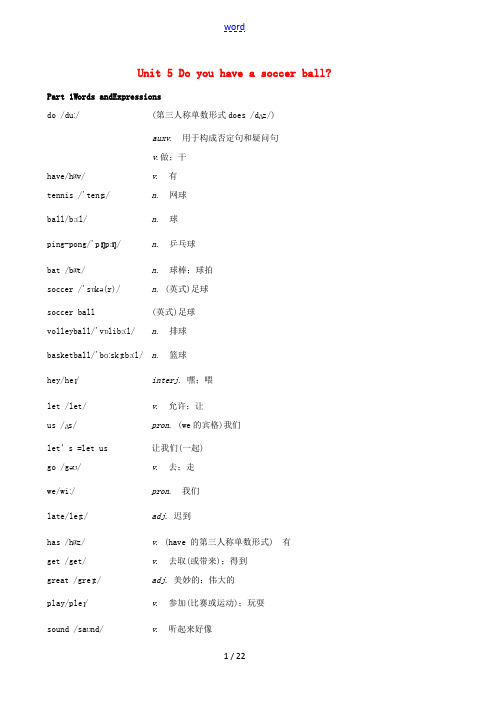
Unit 5 Do you have a soccer ball? Part 1Words andExpressionsdo /duː/ (第三人称单数形式does /dʌz/)auxv. 用于构成否定句和疑问句v.做;干have/hæv/ v. 有tennis /'tenɪs/ n. 网球ball/bɔːl/ n. 球ping-pong/'pɪŋpɔŋ/ n. 乒乓球bat /bæt/ n. 球棒;球拍soccer /'sɒkə(r)/ n. (英式)足球soccer ball (英式)足球volleyball/'vɒlibɔːl/ n. 排球basketball/'bɑːskɪtbɔːl/ n. 篮球hey/heɪ/ interj. 嘿;喂let /let/ v. 允许;让us /ʌs/ pron. (we的宾格)我们let’s =let us 让我们(一起)go /gəʊ/ v. 去;走we/wiː/ pron. 我们late/leɪt/ adj. 迟到has /hæz/ v. (have 的第三人称单数形式) 有get /get/ v. 去取(或带来);得到great /greɪt/ adj. 美妙的;伟大的play/pleɪ/ v. 参加(比赛或运动);玩耍sound /saʊnd/ v. 听起来好像interesting/'ɪntrəstɪŋ/ adj. 有趣的boring/'bɔːrɪŋ/ adj. 没趣的;令人厌倦的fun /fʌn/ adj. 有趣的;使人快乐的n. 乐趣;快乐difficult/'dɪfɪkəlt/ adj. 困难的relaxing/rɪ'læksɪŋ/ adj. 轻松的;令人放松的watch /wɒtʃ/ v. 注视;观看TV/,tiː'viː/ n. (=television /'telɪvɪʒn/)电视;电视机watchTV 看电视same /seɪm/ adj. 相同的love /lʌv/ v.&n. 爱;喜爱with /wɪð/ prep. 和……在一起;带有;使用sport /spɔː(r)t/ n. 体育运动them /ðəm/ pron. (they的宾格) 他(她、它)们only/'əʊnli/ adv. 只;仅like/laɪk/ v. 喜欢;喜爱easy/'iːzi/ adj. 容易的;不费力的after /'ɑːftə(r)/ prep.&conj. 在……之后class /klɑːs/ n. 班级;课classmate/'klɑːsmeɪt/ n. 同班同学Bill /bɪl/ 比尔(男名)Part 2:Texts课文(一)Cindy: Hey, Helen, let’sgo!We’relate!Helen: OK.Cindy: Doyou havethe baseball?Helen: Yes,Ido.It’s in mybag.Cindy: And where’s our baseballbat?Helen: Billhas it.Cindy: Oh,yeah.And doyou haveyour jacket? Helen:Oh, no,Idon’t.It’s on the chair.Let megetit. Cindy: Andyour hat, too!Helen: OK,Ihavemyjacket and hat.Let’sgo!Structure1. Doyou haveabaseball?Yes,Ido./No,Idon’t.Ihaveavolleyball.2. Doyou haveaping-pongbat?Yes,Ido./No,Idon’t. Ihaveaping-pongball.3. Does she haveatennisball?Yes, she does./No, shedoesn’t. Shehas a baseball. 4. Does he haveasoccerball?Yes, hedoes./No. hedoesn’t. Hehas two ping-pongbats.5. Do theyhaveabasketball?Yes, theydo./No, theydon’t.Theyhaveavolleyball.don’t = do not doesn’t = does not句型:—Do/Does sb. have…?—Yes, sb. do /does.—No, sb. don’t /doesn’t.Write eachword inthe correct placeinthe chart.将方框中的单词填入表格中正确的位置。
七年级上 Unit5 Do you have a soccer ball
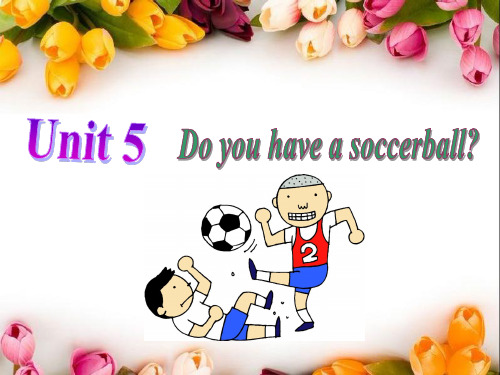
一.用do的适当形式填空。
1. _D_o__e_s_ he watch TV at night?
Yes, he does.
2. _D__o__ you go to school everyday(每天)?
1a Match the words with the pictures.
e
a
d
b
1b Listen and check (√) the description words you
hear in 1a.
√
√
√
1c Listen again. What does Paul say about these
Do you have a soccer ball? 第一课时
Do助动词,第三人称单数形式does。 助动词开头的句子和Be动词开头的句子 一样属于一般疑问句。
I have a soccer ball.
(改为一般疑问句) 分析:原句没有be动词,加一个助动词, 人称要对应。
Do you have a soccer ball ?
Cindy: Helen:
Hey,
OK.
Helen,
l—et—’s
go!
We’r—e —late!
Cindy: —Do—you have the baseball? Helen: Yes, I d—o—. It’s in my bag. Cindy: And where’s our baseball bat?
boring 没趣的;令人厌倦的
- 1、下载文档前请自行甄别文档内容的完整性,平台不提供额外的编辑、内容补充、找答案等附加服务。
- 2、"仅部分预览"的文档,不可在线预览部分如存在完整性等问题,可反馈申请退款(可完整预览的文档不适用该条件!)。
- 3、如文档侵犯您的权益,请联系客服反馈,我们会尽快为您处理(人工客服工作时间:9:00-18:30)。
A.It's on the desk. B.No,they aren't. They're Tom's. C.No,I don't.
D.Three tennis bats.
E.Yes,they do. F.Yes,it's mine.
5.They have two__________ basketballs
二、用do的适当形式填空。 Do you have a tennis ball? 6.—____
—Yes,I ___ do.
7.—______ Does Jim have a ping-pong bat? —No,he _______ doesn't . Does your brother have an MP4? 8.—______ —Yes,he ______ does . 9.—____ Do they have a new TV? —Yes,they ___ do. 10.—____ Do you have a computer?
—No, we ______ don't .
三、单项选择。 they have a soccer ______?
A.Do,balls B.Do,ball C.Does,ball
12.They ______ a good model plane. A.are B.have C.has 13.—Do ______ have a red pen? —Yes,I do. A.he B.she C.you
五、从方框中选答语。 C F D E B A
23.Do you have a basketball? 24.Is this your baseball? 25.What's in the box?
26.Do they have a volleyball?
27.Are these your soccer balls? 28.Where is my tennis ball?
17.Jim has a soccer ball.(改为一般疑问句)
______ Does Jim _____ have a soccer ball? 18.Do they have watches?(改为单数形式) Does he _____ _____ have a_______ watch ? 19.Do Jim and Bill have a TV?(作否定回答) No,_____ they ______ don't .
Unit 5 Do you have a soccer ball?
第一课时 Section A(1a~1c)
1.have的用法 (1)have为实义动词,意为“有”。常用句式为“某人+ have (has)+某物”,表示“某人有某物”。当主语为第三人
称单数时,have用其第三人称单数形式has。
(2)have作动词,还有“吃,喝”之意。 【常用短语】
20.Do you have a radio?(作否定回答) ___ ,___ I_____ . don't No 21.Do they have a tennis bat?(作肯定回答) ____ ,____ ____ . Yes they do 22.My volleyball is under_the_bed.(对画线部分提问) ______ is _____ volleyball? Where your
14.—Do you have a volleyball?
—______.
A.Yes,I am C.Yes,I don't 15.We ______ five basketballs. A.have not C.have B.doesn't have B.Yes,I do
四、按要求完成句子。 16.I have a math book.(改为否定句) I _______ have a math book. don't _______
句型Do you have…?用来询问对方是否拥有某物。回答用Yes
,I do./No,I don't.若要了解第三方是否拥有某物,可用Does he/she have…?来询问。回答用Yes,he/she does./No,he/she
doesn't.
一、根据句意及首字母或图片提示写单词。 1.____ Do you know him? 2.I ______ have a ping-pong bat. ball ? 3.—Where is my soccer_____ —It's under the bed. 4.She has a____________ volleyball
have a class上课
have a look看一看 have a rest 休息一会儿 have a walk散步
have lunch吃午饭
(3)含有have的句子变否定句要在have前加don't。 含有has的句子变否定句要在has前加doesn't,has变为have。 2.—Do you have a ping-pong bat?你有一个乒乓球拍吗? —Yes,I do.是的,我有。
